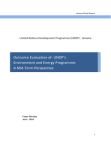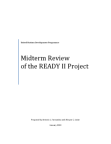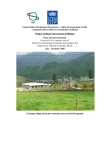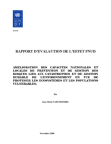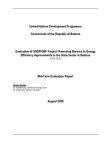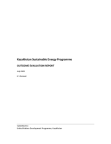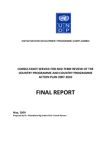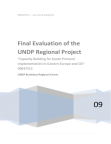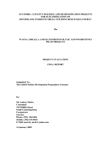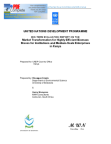The evaluation findings indicate that progress towards the E&E outcome is at an intermediate stage, with the potential for high levels of achievement by the end of the programming cycle.
UNDP
Midterm Review of the READY II Project
The READY Project's overall goal is to contribute to the goal of strengthening the capacities of key stakeholders in localities vulnerable to natural hazards to protect/enhance the quality of the environment and sustainably manage their natural resources, as well as their capacities to prepare an
Community Micro Hydro for Sustainable Livelihood
The Kingdom of Bhutan is a small, mountainous, sparsely populated and predominantly rural Himalayan country, located between China to the North and India to the South. Bhutan has in excess of 30, 000 MW of hydropower potential, of which to date only around 5% has been developed.
Amelioration des capacites nationales et locales de prevention et de gestion des risques
L'effet recherché par le Programme de pays 2005-2009 du Burundi dans le Renforcement des Capacités dans les domaines de l'environnement, de la prévention et de la gestion des risques naturels et des catastrophes est
Removing Barriers to Energy Efficiency Improvements in the State Sector in Belarus
The state sector in Belarus accounts for over 68% of the country's total energy and fuel consumption. As such, the need to reduce the state sector's energy and fuel consumption serves as the main driver for this Project.
Outcome Evaluation on Access to Sustainable Energy
The Outcome Evaluation covers UNDP's sustainable energy programme for 2005-2008, consisting of: Kazakhstan Wind Power Market Development Initiative, Project on Removing Barriers to Energy Efficiency in Municipal Heat and Hot Water Supply, Preparation of Kazakhstan's Second National Communication
Capacity Development for renewable energy management
This mid-term review is coinciding with the reviews of the FNDP and the UNDAF. It is being undertaken with a view to providing an independent in-depth review of implementation progress, transparency and accountability and for documentation of lessons learnt.
Capacity Building for Kyoto Protocol implementation in Eastern Europe and CIS
The Kyoto Protocol provides countries of Eastern European and the Commonwealth of Independent States (EE & CIS) with new opportunities for reducing their greenhouse gas (GHG) emissions, moving their development towards a low?carbon path, mobilizing resources for environmentally friendly techn
Capacity Building for Renewable Energy: Wauna, Orealla and Kato Photovoltaic and Woodstoves Pilot Projects
This project evaluation, concerns the capacity building and demonstration projects for the electrification of hinterland unserved areas, utilising renewable energy. The objectives of this project were to increase knowledge and skills development for upstream policy and planning.
Market Transformation for Highly Efficient Biomass Stoves for Institutions and Medium-Scale Enterprises in Kenya
This GEF-funded market transformation for highly efficient biomass stoves project is aimed at removing market barriers to the adoption of sustainable biomass energy practices and technologies by institutions (schools and hospitals) and small businesses (restaurants, hotels) in the rural and urban



